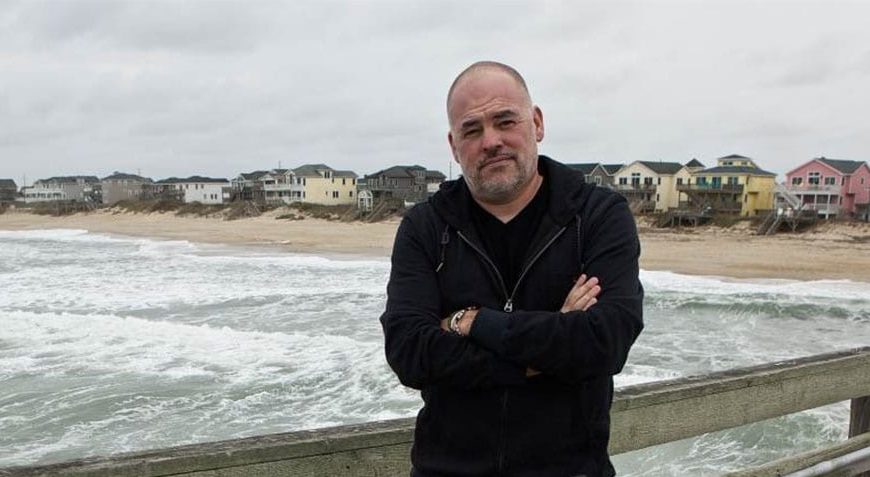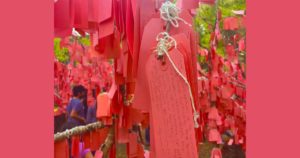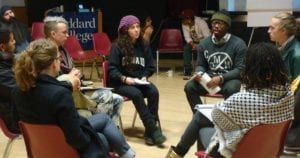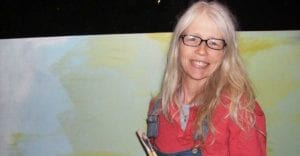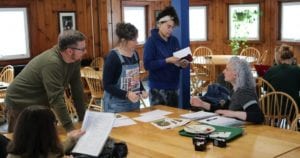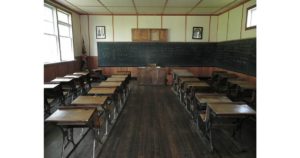 “Would you like to see your mother one more time?” asked the huge blonde woman with a Norwegian last name, one of a set of triplets who had taken over the funeral home from their father in Scottsdale, Arizona.
“Would you like to see your mother one more time?” asked the huge blonde woman with a Norwegian last name, one of a set of triplets who had taken over the funeral home from their father in Scottsdale, Arizona.
For one amazing moment, I thought this might actually be possible. I thought I might be able to see her, sitting in a wicker chair, black hair, black eyes, Love That Red lips, Jane Russell legs crossed, a Salem in one hand, a chardonnay in the other, head thrown back and laughing.
But no, she meant, did I want to look at a dead body in a white plastic bag.
I had flown out that afternoon from New York while my sister was flying back there, our planes passing, we imagined, in the sky. At least our vapor trails co-mingling. Because of the time change, I guessed this might be somewhere over Illinois. The middle of the country. Where we were born. I had always credited the midwest with why we both had careers in the East: from the middle, you could go anywhere.
I had packed for a two week stay, at which point we would repeat this maneuver. This is how it had been for going on two years. We were kind of used to it. I landed and drove straight to Scottsdale, opened the door of the condo and found my mother in the portable hospital bed, positioned in front of the dining-room window so she could watch the gibbering quail in the back yard, awake. The nurse’s aide was ready to leave. She wore a huge crucifix around her neck and spoke as if in church.
“Your mother had a lovely day,” she whispered, as if it were all her doing. “I read her passages from the Bible!”
I glanced at my mother. She rolled her eyes.
“That was very nice of you,” I said, not wanting to hurt her feelings, “but this is all humiliating enough for her.”
Confused, the aide collected her faux designer pocketbook paid for by my mother’s illness, and left.
I went to my mother then and bent down to say hello. She grabbed me, pulled my face to hers and kissed me all over. Then the telephone rang, and she let me go, smiling triumphantly. I wasn’t going to answer it, but she gave me that “are you an idiot?” look, and I complied. It was my kids. They didn’t understand their geometry and they didn’t know where Dad was. I pointed out that it was ten o’clock at night there, and it would all be obvious in the morning if they went to bed. That Dad was probably out walking the dogs. That they sure had waited until the last minute to find this out. I glanced at my mother to get her reaction, but she had turned her face to the quail out the window. I could hear her breathing. I spent a few more moments discussing the hypotenuse, and hung up. I poured myself a glass of wine, and finally sat down to talk to my mother. She was gone. I had arrived in the middle of her final bow. In medias res.
I sat still only a moment before rushing back to the phone to call everyone I was supposed to call. But the phone was now dead. My cellphone had no service. I apologized to the body of my mother, broke out of the condo into the rent-a-car, careening down the road towards town until I had enough bars. When I got back, a man arrived all by himself, zipped my mother into a body bag and drove her away in a shining white van.
“No,” I said to the big Norwegian gal funeral director. “But thank you.”
And that was it. I never saw my mother again. A few days later, I picked up a box containing her “cremains”, as Ms. Hansen had called them. I was surprised how heavy ashes are. And how certain I was that they’d made some mistake: this could not be my mother.
Ten years later. The middle of the night. The old dog was howling like a coyote, something I had never heard him do. When I got up to check on him, he was lying on the kitchen floor, watching the crows out the window. I sat down beside him, put my hand on his chest, and felt his heart beat into my palm awhile until it stopped.
Two hours later, I was driving with the body of my dog wrapped in a bath towel on the back seat, to Buddy’s Place Pet Crematorium and Forget-Me-Not Shop in Hudson, New York. It was a raw March morning and the clouds were dense and low.
I found the gravel lane off a farm road and wound my way behind the house, as instructed by Karen Walker, Proprietor, over the phone. There was the chimney, stretching up to the sky behind the lilac double-wide trailer where she lived. I could hear the gas jets firing the two-story high incinerator in her back yard over the engine of my car, the tires rattling gravel, and the radio tuned to All Things Considered on NPR. It began to snow.
Karen came out of her house then. She wore work boots, a brown down vest and an orange wool hunting cap. She nodded to me and let me into the shop. Before we were all the way in, though, she turned and startled me with a big hug. I had been all right until then. Other people’s grief for other people grieving always caught me off-guard. Wordlessly, she sat down at her desk and pointed to a green upholstered metal chair. I sat and looked around.
“You have some choices to make,” she began.
I could see that I did. I could choose between the two-foot granite stone urn shaped like a labrador (the universal symbol for beloved pet dog), a beautiful wooden box onto which I could have carved Chris’ name, or something that looked like a tea-tin with violets printed on it. I could also order an engraved headstone in pink or grey shaped like a dog bone. Price tags hung from every sample item.
My mother was in a ziplock bag on a shelf back home in my closet. I was afraid to spread her ashes because ever since I left home, at any moment, I might move.
“Take all the time you want,” said Karen. “I’m not going anywhere.”
Oh yes you are, I thought to myself. You can’t see it because you’re in the middle of it. But I couldn’t say that.
Karen explained how she had a great dane in there right now, and it would take awhile for him to get done, and then she would attend to Chris.
I liked her more and more. She had an old-timey voice, like a midwestern grandmother, and there were pictures of her kids and grandkids all over her desk. And also, numerous labradors, with poems inscribed in their frames that began: “Until we meet again at the rainbow bridge…”
I chose the violet-covered tin. Chris was the only dog I’d ever had who suffered my absences, but I couldn’t do more for him than I’d done for my mother. It didn’t seem ethical. Life didn’t seem ethical either, for that matter. But here we were in the middle of it, unable to know that, the past like a view out a window, the future where we thought we were.
I signed some papers, handed Karen the credit card with the least debt on it. And then she put her hand on mine and squeezed it like a Grandma.
“Would you like to see Chris one more time?” she asked.
For one amazing moment I blanked as to where I was. I thought I could actually do that, one last time again, stroke his ears as he lay across my feet, trapping me where I sat, his woolly white fur completely obscuring his eyes, only his black nose indicating the difference between his butt and his face.
“No,” I replied. “But thank you.”
A few days later, I picked up the tin. Surprised once again by the weight of ashes. I brought him back home, opened the closet door, and set him beside my mother. When you are in the middle of it, you are a part of it, the past and future all around you, like a million-dollar view. Your faculties are most at play, the stakes are high and the subtext clear, no matter how absurd. And the only way out is in any direction.

